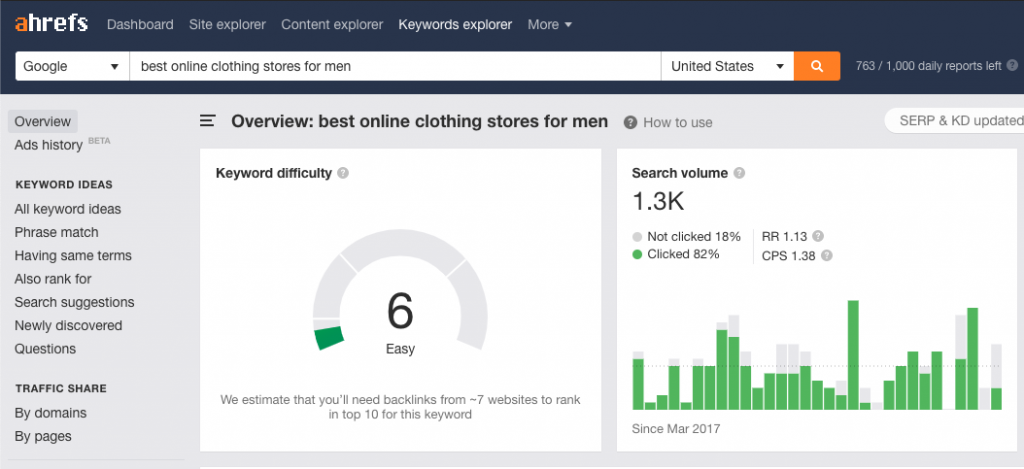A lot of SEO’s still struggle with ranking their website successfully on Google. One of the most common reasons for that is a bad choice of Keywords. A keyword generally describes a search phrase, that people are looking for on Google every month. In this article, you will learn exactly how to find the best keywords for your website, regardless of your industry or niche.
What’s the difference between On-Page and Off-Page SEO?
When we are talking about Search-Engine-Optimization (SEO) in general, we are dividing the whole process into two different areas: 1. On-Page SEO and 2. Off-Page SEO.
While Off-Page SEO includes all the tasks that take place outside of your website, On-Page SEO describes everything you can find on your website. This obviously starts by your website itself (structure, indexability, errors, etc.) and goes along right to your content.
Why most people try to rank for the wrong keywords
Often times you will find people who are trying to rank for the biggest related search term they can possibly find. Let’s say you’re selling men’s clothing online and want to attract more customers for your brand. Trying to accomplish this goal by doing SEO requires you to find rankable (and relevant) keywords.
That’s where the trouble shoots in for most people. Instead of focussing on Keyword Metrics like Keyword Difficulty (KD) or the Search-Intent (SI) for this keyword, most people solely focus on the monthly search volume, before they start to create content.
What is Keyword Difficulty?
The Keyword Difficulty (KD) of a search phrase measures how hard it is to rank for a phrase on Google. The KD correlates with the number of Inbound Links to the Top 10 pages ranking for this keyword. That being said: If your competitors have thousands of high quality backlinks pointing to their article, the Keyword Difficulty is usually pretty high.
Now, let’s stick to our example of selling men’s clothing online. Let’s assume you’ve found keywords like “clothing”.
Search phrases like this are (kind of) relevant to what you are selling, but we have some huge differences in the Keyword-Search-Intent and competition. Meaning: Even if you’re able to rank for this keyword, your Return-on-Invest (ROI) won’t be really rewarding.
What does Keyword-Search-Intent mean?
When we are talking about the Search Intent of a keyword, we mean:
What is a person looking for, when he or she searches for this phrase on Google?
In general, there are four different intents a search query can have:
- Informational Search Queries: weather berlin, cake recipe, how to rank on google
- Transactional Search Queries: best laptop under 1000 €, bbq smoker test
- Navigational Search Queries: nike online shop, whole foods los angeles
- Branded Search Queries: nike, adidas, apple
Usually, people are looking to accomplish some kind of goal when they are looking for a keyword on Google. The search intent just describes if this specific goal is of informational or commercial nature.
That being said, there’s a small trick on how to find keywords that have a clear and laser-focused search intent.
The difference between Short-Tail and Long-Tail Keywords
If you want to identify the search intent more clearly and easily, you can instantly look for Long-Tail Keywords of a search phrase.
So let’s say “clothing” is our “Short-Tail” keyword (usually consisting of 1-2 words), a commercial long-tail variation of this keyphrase would be “buy clothing online”. If you want to be ultra-focused, look for terms even more relevant like “best online clothing stores for men”.

You can identify Long-Tail Keywords by “more words” inside the phrase. Meaning that a Long-Tail Keywords naturally consists of three or more words. By having more words inside the search phrase, it’s becoming easier for us to identify the search intent of a keyword.
Therefore we enable ourselves to create the best content possible. By doing that, you’ll build a lot of relevancy for your content, which will result in better rankings for your article. Last but not least, here are the three main takeaways for a successful Keyword Research.
3 Key-Takeaways for a successful Keyword Research
- Pick Keywords with a minimum search volume of 150
- Choose keywords with a Keyword Difficulty ( KD 40)
- Find Long-Tail Keywords similar to your focus keyword and use it in your subheadlines (H2 + H3) to rank them with your article